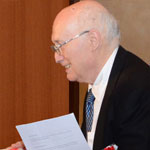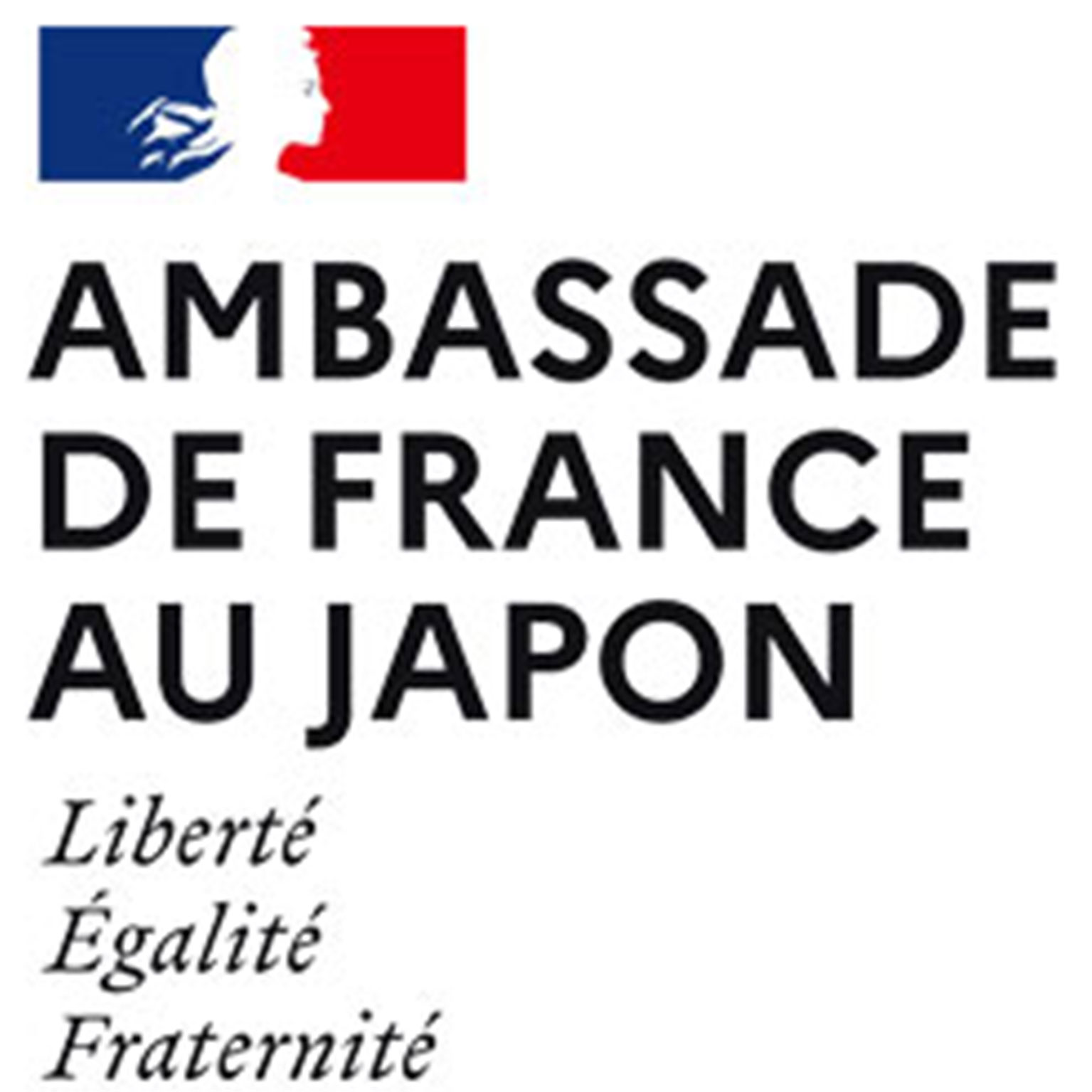- ホーム
- Lauréats et Cérémonie du Prix Scientifique Kiyoko Goto et Paul Bourdarie
- Lauréats du Prix Scientifique Kiyoko Goto et Paul Bourdarie
- 13ème édition du prix scientifique Kiyoko Goto et Paul Bourdarie(2024)
Lauréats du Prix Scientifique Kiyoko Goto et Paul Bourdarie
13ème édition du prix scientifique Kiyoko Goto et Paul Bourdarie(2024)
2025.4.1
| Title | Kiyoko Goto and Paul Bourdarie Scientific Prize |
|---|---|
| Laureate |
 Masahiro TSUBOI, M.D., Ph.D. |
| Director and Chair, Department of Thoracic Surgery , National Cancer Center Hospital East | |
| Paper | Overall Survival with Osimertinib in Resected EGFR-Mutated NSCLC (The New England Journal of Medicine:2023 Jul 13;389(2):137-147.) |
| Reason for selection (Dr. Jun NAKAJIMA, Chairman of the Advisory Committee) |
Dr. Tsuboiʼs paper presents a landmark phase III clinical trial demonstrating the efficacy of adjuvant osimertinib in treatment of EGFR mutation-positive non-small cell lung cancer (NSCLC). All reviewers commend the studyʼs high quality and its role in establishing adjuvant osimertinib as a new standard treatment. The findings provide robust evidence that osimertinib significantly prolongs both recurrence-free and overall survival in patients with resected, locally advanced NSCLC, marking a paradigm shift by introducing postoperative targeted therapy rather than waiting for recurrence. The study is recognized for its global impact and contribution to the advancement of lung cancer treatment. Reviewers highlight the groundbreaking nature of the research, its strong clinical evidence, and its influence on the field. Additionally, Dr. Tsuboi, a key contributor, is acknowledged for his extensive expertise and significant contributions to lung cancer research, further solidifying the studyʼs credibility and importance in clinical oncology. |
| Message from the Laureate |
How it started: After completing my training at the National Cancer Center Hospital, I was involved in a multicenter collaborative research project to develop preoperative and postoperative adjuvant therapy for lung cancer as one of my life's works. In 2002, I was involved in the launch and implementation of a company-led clinical trial using gefitinib, an EGFR (epidermal growth factor receptor) phosphorylation inhibitor. This trial was stopped shortly after its initiation after experiencing a death due to suspected drug-induced lung injury from gefitinib. In 2004, EGFR mutation was found to be a predictor of EGFR inhibitor efficacy, which led to the development of EGFR inhibitors for EGFR-positive lung cancer. A similar trend was underway for postoperative adjuvant therapy. Physician-initiated trials using gefitinib were conducted in China and Japan, but none of them resulted in OS prolongation. (I participated in the IMPACT trial in Japan as a coordinating physician.) With the introduction of Osimertinib, a third-generation EGFR inhibitor, the development trend has shifted. Around 2013, a company initiative was initiated for postoperative adjuvant therapy, and I was selected as one of the global principal investigators to participate in the ADAURA trial. Study Background: The study was conducted from November 2015 to February 2019 with 682 patients (339 on osimertinib and 343 on placebo = control). An interim analysis was performed at 24 months of randomization based on the number of events monitored. In stage II-IIIA patient population, the recurrence-free survival (DFS) rate in the placebo group was 44% compared to 90% in the osimertinib group, with a hazard ratio of 0.17. In stage IB-IIIA population, the hazard ratio was 0.20. Based on these results, in October 2020, U.S. and European regulatory authorities expanded the indication for osimertinib for adjuvant therapy, and NCCN (one of the U.S. guidelines) and ESMO (European Society of Clinical Oncology) guidelines also recommended osimertinib for postoperative adjuvant therapy. OS analysis was performed when the interim follow-up period exceeded 60 months in the osimertinib group. In the stage II-IIIA population, the placebo group had an OS of 73% versus 85% for osimertinib, with a hazard ratio of 0.49 (osimertinib reduced the risk of death by 51%). These results indicate that postoperative adjuvant therapy with osimertinib prolonged not only DFS but also OS. Difficulties: The Japanese regulatory agency (PMDA) had defined prolongation of overall survival (OS) as the primary endpoint for adjuvant therapy and would not allow expansion of the indication unless OS data proved benefit. Based on the findings that OS data suggested efficacy, PMDA granted insurance approval in August 2022. Meanwhile, the Japan Lung Cancer Society's 2023 edition of its guidelines for lung cancer treatment also stated that “the basis for the recommendation is not clear” until OS results were available. The results showed that 12% of the respondents decided to “recommend not to perform” the procedure. OS data were first presented to the world at ASCO (American Society for Cancer Care) and New England Journal of Medicine: NEJM in June 2023. The results of this study led to a “recommendation” in the 2024 edition of the Japanese Guidelines for Lung Cancer Treatment. In response to the belief that OS is an absolute requirement for postoperative adjuvant therapy, I was frustrated that I could not publish the data until the ASCO presentation, even though I knew about the OS data. I was told by several doctors that I was surprised that I could hold out for more than half a year knowing the results, but I felt that if I had trusted the PMDA's judgment, I could have delivered the data to my patients a year earlier. Future applications and development: The results contribute greatly to the development of postoperative adjuvant therapy with molecularly targeted agents, and similar results have been observed with ALK inhibitors. The development of adjuvant therapy for EGFR mutation-positive lung cancer will follow along with that for stage IV lung cancer. There are already more effective therapies being developed than osimertinib. At this point in time, the balance of efficacy and toxicity has maintained the usefulness of osimertinib as an adjuvant therapy, but I look forward to scientific advances, including the development of treatments for resistance mechanisms. On the other hand, based on past findings and the results of the placebo group in this study, 30% of stage II-IIIA patients can be cured by surgery alone, suggesting that postoperative adjuvant therapy is not necessary for all patients with EGFR mutation-positive lung cancer who undergo complete resection. I believe that patient selection using liquid biopsy and other methods for pathological findings of resected specimens will be a near-term issue. I hope to use the prize money received for this study. |
| Title | Kiyoko Goto and Paul Bourdarie Scientific Prize -Special Award |
|---|---|
| Laureate |
 Tomotaka UGAI, M.D., Ph.D. |
|
Instructor, Harvard Medical School and Brigham and Women’s Hospital Department Associate, Harvard T.H. Chan School of Public Health |
|
| Paper | Is early-onset cancer an emerging global epidemic? Current evidence and future implication. (Nature Review Clinical Oncology:2022 Oct;19(10):656-673. ) |
| Reason for selection (Dr. Jun NAKAJIMA, Chairman of the Advisory Committee) |
Dr. Ugaiʼs study highlights the rising global prevalence of juvenile-onset cancers, emphasizing its significant public health, social, and familial impact. Reviewers praise its thorough analysis of contributing factors, including improved screening, environmental exposures, and unique clinical characteristics in young patients. The research underscores the urgent need for targeted prevention and intervention strategies, providing actionable recommendations based on environmental, dietary, and cultural influences. It effectively raises awareness of the increasing incidence of early-onset cancer and calls for prioritizing research into its causes and prevention. Additionally, Dr. Ugai is recognized for his substantial contributions to this critical field, with an impressive record of publications in major international journals, further reinforcing the studyʼs credibility and importance. |
| Message from the Laureate | Evidence on the global incidence trends of early-onset cancers (defined as cancers diagnosed in adults <50 years of age) was scarce. We have conducted a global cancer incidence analysis of early-onset cancers and showed that, over the past several decades, the incidence of early-onset cancers in the breast, colorectum, endometrium, esophagus, extrahepatic bile duct, gallbladder, head and neck, kidney, liver, bone marrow, pancreas, prostate, stomach and thyroid has increased in multiple countries. Since the mid-20th century, substantial multigenerational changes in the exposome have occurred (including changes in diet, lifestyle, obesity, environment and the microbiome, all of which might contribute to the global rise of early-onset cancer incidence. We have also shown differences in both clinical and tumor characteristics between patients with certain forms of early-onset and later-onset cancer. To publish this paper, we had held weekly meetings more than one year. Since we submitted our paper, we had spent so much time and energy until acceptance. After publication, this paper attracted global attentions and has been cited by many papers. Addressing this early-onset cancer challenge will require interdisciplinary collaborations that could include oncologists, epidemiologists, biologists, environmental scientists, geneticists, etc. across the globe. I do hope that this award will facilitate such global and require interdisciplinary collaborations. I also hope to lead this field as one of the global leaders. |





